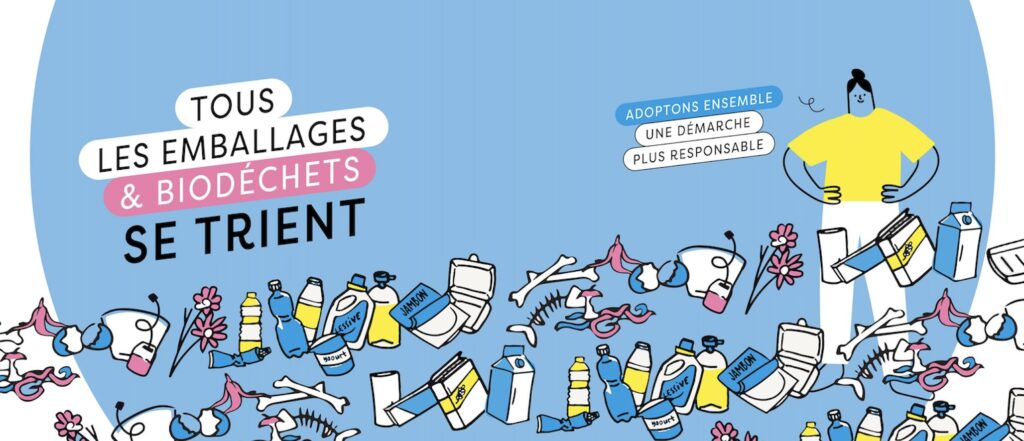Selective sorting
AT UNIVERSITY, I SORT TOO!

From 2 September 2024, the Department of Living Environment and Security (DCAVIS) will provide collection points in high-traffic areas, both outside and inside buildings, to make it easier to sort packaging. At the same time, between 2 and 6 September, rubbish bins will be removed from offices and classrooms, and collection points for bio-waste will be set up in break rooms and near food dispensers.
This FAQ (frequently asked questions) provides answers to the most frequently asked questions about selective sorting. It will help you to better understand the issues, practices and benefits of selective sorting, so that you can involve the whole university community in this environmentally-friendly approach.
Is your question not in the FAQ?
Send a ticket to the Direction du cadre de vie et de la sécurité (DCAVIS) via ENT.
Collection points are set up to encourage participation in selective sorting. The aim is to increase the overall recycling rate on campus and reduce the amount of waste produced.
Sorting points are strategically located on both campuses, in high-traffic areas. They are located in common areas such as lobbies and cafeterias, and close to the main buildings.
They are emptied twice a day by sorting staff.
The sorting points are designed to collect all cardboard, plastic and metal packaging.
Plastic films (water pack, milk pack, newspapers, toilet paper, paper towels, etc.), cleaning products (detergent, washing powder), bottles (shower gel, shampoo), tubes (toothpaste, cream, etc.), food bottles (water, soft drinks, milk, oil, etc.), polystyrene and plastic trays (ham, meat, ready meals, biscuits, etc.), pots (yoghurt, cream, etc.), plastic bottles (water, milk, oil, etc.).), food bottles (water, soft drinks, milk, oil), polystyrene and plastic trays (ham, meat, ready meals, biscuits, etc.), pots (yoghurt, cream, etc.), sachets (salad, biscuits, sliced bread, etc.), bags (croquettes, frozen food, etc.).
Any doubts about waste? Visit the Greater Avignon website
Food cartons (milk, fruit juice, soup), small cartons (cereal and biscuit boxes), yoghurt wrappers, pizza boxes, egg cartons, etc.
For large quantities of cardboard, blue bins are available at the entrance to each campus. For certain departments (BU, technical hall, etc.) or in the event of large-scale deliveries of equipment, bins can be made available. Contact the DCAVIS by ticket.
Any doubts about waste? Visit the Greater Avignon website
Trays, tins, aerosols, deodorants, hairspray, cans, syrup cans, etc.
Any doubts about waste? Visit the Greater Avignon website
Small quantities of paper (e.g. exam papers) are disposed of in the yellow sorting bins. Copies and archives may not be placed in the yellow sorting bins. You must contact the university's archives unit archives@univ-avignon.fr to collect and dispose of it in accordance with the regulations.
Clean glass (very little waste generated in the school) must be disposed of in specific containers located near the campuses: place Pasteur, rue Rascas, for the Hannah Arendt campus and rue Michel de Montaigne, in front of the car park entrances, for the Jean-Henri Fabre campus.
Food waste should be disposed of in the dedicated bio-waste collection points that will soon be installed in break areas and near food dispensers.
All non-hazardous biodegradable garden or park waste, food waste and comparable waste from food processing plants: leftover food, wilted flowers, etc.
In the break rooms, small bins will be set up and emptied twice a day by the maintenance staff. Next to the food dispensers, white bins will be set up for food scraps, which will also be collected twice a day.
In the gardens on the Hannah Arendt campus, a student project is underway, involving experimentation with composting flower pots. Information will be provided when the project is up and running. On the Jean-Henri Fabre campus, at the request of the teaching staff, we have acquired large-capacity composters that will be managed by the teaching teams and the vegetable garden leaders.
Waste that cannot be recycled (tissues, paper towels, etc.) must be disposed of in the bins intended for non-recyclable waste (black bins), which are left in all university toilets.
95% of the waste produced at Avignon University can be recycled, with only intimate protection products and paper towels in large quantities not currently entering conventional sorting channels. It has therefore become necessary to do away with individual bins that are not labelled "selective sorting", to enable the relevant flows to be separated. This will promote a collective ecological awareness by reducing the contamination of recyclable waste by non-recyclable waste.
Once sorted, the recyclable waste is collected by Greater Avignon on organised rounds. It is then transferred to the SIDOMRA reprocessing and sorting plant. Contrary to popular belief, not all waste is incinerated.
Recycling bins on wheels, which take up very little space, can be made available. Please contact the DCAVIS by ticket.
Yes, this is also compulsory for our external service providers and users. They will be given a charter and the sorting clauses will be included in the agreements.
- Flatten plastic and cardboard packaging and leave the caps on (they can be recycled too!)
- Do not stack packaging together
- There's no need to wash your packaging before sorting it - just empty it well.
- Do not put your sorted packaging in plastic bags. They should be placed loose in your bin or voluntary drop-off point.
- Do not tear or crease paper before sorting.
By doing the right thing, packaging can be more easily identified at the sorting centre, so that it can be recycled.
Incorrect sorting can lead to contamination of recyclable materials, making the sorting process more difficult and more costly for the university. It can also affect the quality of the materials recycled and compromise the overall effectiveness of the recycling programme. By adopting good sorting practices, we help to facilitate the work of sorters and optimise waste recycling.
Updated on 18 February 2025